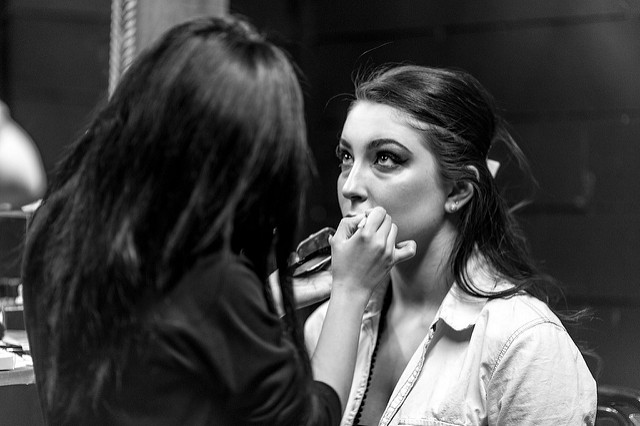Wind Machine
I do not know her, the woman caught
in the passions of the wind machine
as the cameras work their angles,
her hair blown back to imitate the spirit
of youth and whatever they are selling
I do not know her, but I love her hair,
the way it moves about in the stillness
of the photo, the bedroom tangle just so.
Must be something in the look of speed,
the illusion of approach, that keeps
hands flipping the pages to feel the breeze.
But we know better. If winds could pass
out or wither from exhaustion, it’s here,
in fashion pages glazed as cakes and fast
cars that men afford when they are old.
We know the wind is not the paper it blows
any more than breath is flesh, flesh a wind
machine we take apart and reassemble.
I do not know the woman or her product,
though I like to think she is paying off
her student loans, and the gaze she wears
she has borrowed from a man, a stranger
with a long lens, who whispers, yes, yes.
What I do know is the wind is real wind,
sweeping back and forth from some machine
that says, no, to the camera’s little death,
the blades of the shutter, the capture of souls.
Who has not had a troubled love affair
with stillness and walked the galleries filled
with dead and beautiful things and felt renewed.
You hear a lot when the world goes still.
Just you and the portrait of the woman
with her sick child who, if lucky, died old,
possessed by spirits such as yours. And then,
you are that child. You are the wind
in the lungs of the child and ask your mother,
is she afraid of death, and she whispers,
no. Her hand is in your hair. It’s nothing,
she says. And then, more softly, nothing, nothing.
¤
The Progress
If you sit still, you can hear it, the thrum
of the power cables that puzzle a sky
grown intricate with satellites, doors,
hands that write the checks to make them open.
It was always this way, not the cables
but how a puzzle loves a harder puzzle,
the cell an animal, the beast a town.
Long ago my mother taught me to be
hungry, to pry the shutter on our piano
that carried the tune she always longed to play.
If you sit still, you can hear it, the clock
among the millions who grow old with us,
who sit beside radios and gold frames,
snapshots of the kids when towns were small.
Long ago progress was a river
fed by snows that never ceased to fall.
The bombs we invented we would invent
into extinction. So said the music
in my teacher’s voice. I loved her. I listened.
I hid beneath my desk from history’s
strange devices and the will to use them.
But the sky is different when we are small.
A bolder, more manic blue. Long ago
I laid my hands down, ambitious to play
a piece to fill the emptiness of ambition.
Always a city inside the city, rising,
complicating its traffic like a tax code
or circuit board that makes hands obsolete.
I met a man once who feeds the homeless
of Los Angeles. It’s complicated, he said.
They break the law to live now, they must,
In other words, the law is broken, shattered
into the numberless financial concerns
that move their eyesores further into hiding.
Which says, I live in many cities. In one,
the smoke of factories and oil drums.
In another, a mother’s love that tells me
how to hide, to hunker in the basement
when the missiles fall. So simple then,
we thought our sunglasses would make a difference.
Or that hope might repossess the anthem
in our hands. If you sit still, the room goes dark,
the world more articulate with stars,
with the flashlights of phones that screen our calls.
Music is everywhere we aren’t these days.
And yet it touches us, we cannot help it,
the child’s hope that feels a little hopeless.
It moves to move us, snowing in elevators,
spilling through the windows we cannot open,
in fallen light of which, we will, we will.
¤
Bruce Bond is the author of fifteen books including, most recently, For the Lost Cathedral (LSU, 2015), The Other Sky (Etruscan, 2015), and Immanent Distance: Poetry and the Metaphysics of the Near at Hand (University of Michigan Press, 2015). Four of his books are forthcoming: Black Anthem (Tampa Review Prize, University of Tampa Press), Gold Bee (Crab Orchard Open Competition Award, Southern Illinois University Press), Sacrum (Four Way Books), and Blackout Starlight: New and Selected Poems (L. E. Phillabaum Award, LSU). Presently he is Regents Professor at University of North Texas.


